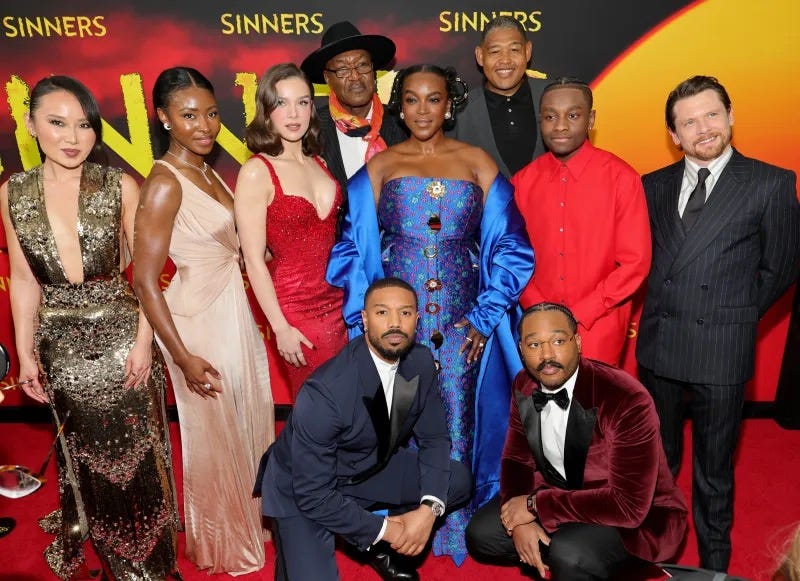I’m not gon’ hold you long. I done seen Ryan Coogler’s epic movie, Sinners, and enjoyed it so much, I watched it twice. Once with my beloved wife, Rev. Dr. Gabby Cudjoe-Wilkes, again with my family in Atlanta.
If you haven’t seen the movie, watch it. If you have, here’s a little something for you below. I’ve included brief commentary alongside my favorite sayings and quotes from this genre-bending, beautiful film.
Enjoy! - Andrew
Practical theory of work. “jump on the work don’t let the work jump on you”. This comment from the opening scene reflects a can-do attitude about carrying on a decent day’s work. Without glorifying labor, nor understating its demands, the phrasing rings true. You really do have to jump on your work — whatever it is — before that thing jumps on you.
The geography of racism. “Chicago ain’t *** but Mississippi with tall buildings instead of plantations”. SINNERS is set in 1930’s Clarksdale, Mississippi. At least the first part is. It was moving to witness its lead characters riding through the picturesque cotton fields, declaring that the Northern cities of America have their own varieties of racism. That metropolitan areas like the Chicagoland region, and not only the Mississippi Delta region, exist under the long shadow and afterlife of chattel slavery. Put another way, this bit of dialogue took a strong swipe at the southern exceptionalist story of racism. It’s not just in the South, though, they seem to say. As Malcolm X used to say, everywhere south of Canada is the South, not just the formerly Confederate states.
Paradox of (all) religious experience. There’s a tender, tender scene in SINNERS between two of the protagonists, an on again, off again couple. The couple, during one of their on again moments, have a steamy exchange that covers a variety of themes: money, the power of roots and prayer, etc. In a fit of disbelief, one character inquires: “why them roots didn’t work on our baby then”? The other character pauses, perhaps taking in his query and drawing from the wellsprings of her love and religious expertise. She responds finally, “I don’t know. But it worked for you”. This quote — not unlike William James’ Varieties of Religious Experience — captures the ambiguity of religion. Sometimes one prays for the sick, the sick recover. Sermons preached equals lives transformed. Prophesies spoken do indeed come to pass. My life is a witness. Except that sometimes we hold all the faith, experiencing little of its breakthroughs. This uneven correspondence between faith and outcome is a stubborn fact of all religious experiences, regardless of the content of their claims, the fervor of its adherents. One edge of the pole contains the “I don’t know” aspects, the humility of faith. But the other edge is, “but it worked for you”, the testimonies of the faithful, too.
Eat, drink, and be merry! “I play and get as much corn liquor as I can drink. A sinner like me can’t ask for much more than that”. Contrary to popular belief, eat, drink, and be merry is indeed in the Bible. The positive spirit of this saying is that pleasure has its place in every human lifespan. There’s accountability to self, neighbor, God, for sure, but there’s also this gorgeous terrain of pleasure, joy, excitement. Such facets of living deserve their say as well.
The leverage and limits of money. “I ain’t never seen no roots, no ghosts, no demon, just power, only money can give you that”. This quote reads something like a materialistic manifesto. But I hear it as a weathered realism, despite being an exaggerated one. It is debatable whether money, instead of force or violence, is the root of power. Deeper still, I’d argue that the powers of Spirit — what Gandhi called in his context, satyagraha or truth-force — is a more fundamental source of power than violence, force, or money. Those important points aside, money in the form of commercial value, public investment, pennies and nickels, whatever we’ve got, is an undeniable basis of influence in every society. I’ve lived long enough to watch billionaires purchase City Council seats in NYC, U.S. Congressional seats, a few Supreme Court seats, even a seat in the Oval Office— the Presidency. Money and power must be dealt with, as the characters in Sinners argue. Here’s one good attempt to think through public finance and collective resource generation.
When benedictions establish a good boundary. “May God watch over you and be with you”. An indigenous community speak these words as a boundary and conversation stopper. It hit home. Sometimes, there’s nothing left to say but God bless you, God keep you, I’ll holler.
The transcendent power of music. “There are people born with the gift of making music so true, it can pierce the veil between life and death…” These words introduce the most daring, imaginative scene in the entire movie. In two minutes, blues and funk come together, gospel and hip-hop, African and Asian legacies of dance, culture, and music converge as synecdoche, where small examples hint at wider continental traditions. It’s an ambitious attempt that mostly succeeds. Music is a more basic form of human communication — revelation — than sacred text. This is why, for example, generous portions of most Protestant Bibles enjoyed a pre-canonical life as hymns, psalms, anthems, ritual moments of dedication. Stevie Wonder wasn’t lying when he sung on Sir Duke, “music is a world within itself, in a language we all understand”. Lauryn Hill called it straight when she intoned, “c’mon baby, light my fire…music is supposed to inspire, so how come we not gettin’ no higher”?



